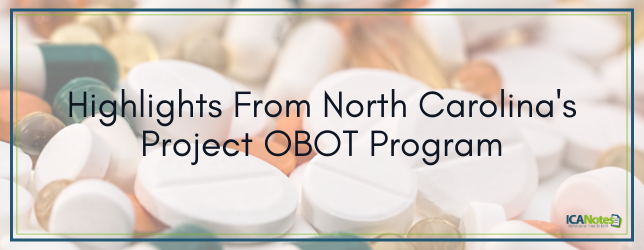Highlights From North Carolina’s Project OBOT Program

The first step in alleviating an epidemic is to provide the resources necessary for improvement. As opioid addictions continue to skyrocket across the country, states like North Carolina are taking strides to improve communities through training programs and support. The American Medical Association recently highlighted some of the largest efforts in the fight against opioid addiction by focusing on a North Carolina Medical Society Foundation initiative called Project OBOT.
This program stands for office-based opioid treatment and aims to educate, train and allow North Carolina health professionals to prescribe medication-assisted treatment (MAT) to individuals trying to free themselves from addiction. North Carolina opioid-assistance programs shine a critical light on areas of improvement for public health and treatment services.
What Is Project OBOT?
The goal of North Carolina’s OBOT program is to make medical treatment for opioid addiction more readily available to the general public. Project OBOT trains physicians on common MAT methods for a waiver from the federal Substance Abuse and Mental Health Services Administration. Guiding physicians to the eight-hour training program results in professionals being able to prescribe top MAT drugs to assist with opioid addiction, including the following:
- Buprenorphine
- Methadone
- Naltrexone
Project OBOT is increasing access to prescription MAT drugs for those who would normally be unable to counter the addictive qualities of opioid substances. In just its first year, North Carolina’s Project OBOT provided training to hundreds of practicing doctors for MAT prescriptions. Those in North Carolina seeking help are having an easier time finding it quickly thanks to Project OBOT.
Project OBOT Successes
Opioids are extremely addictive substances that carry intense side effects if use stops abruptly. This cause and effect cycle typically increases chances of a relapse, but Project OBOT is partnering with local pharmacies to make MAT drugs affordable for all. It developed an independent pharmacy network to reduce prescription payment costs by nearly half of what refills used to cost. Through the use of pharmacy benefit cards, patients can stick to recovery plans, as medication prices are more affordable.
Project OBOT Takeaways
Not all states are experiencing the opioid epidemic, but those that are can learn a great deal from Project OBOT. This organization tackles opioid addictions at the source by eliminating the stigmas surrounding the recovery path. Professionals can deliver widespread assistance to those in need through prevention, identification, treatment and aftercare services.
States interested in implementing programs similar to Project OBOT should focus on the following steps for reducing opioid addiction across entire communities:
- Increase access to MAT.
- Make MAT prescription drugs more affordable.
- Improve health care efforts to avoid patients waiting in long lines.
- Bring mental and behavioral health initiatives to the same level of importance as physical health programs.
- Educate communities and professionals on the topic of pain management.
Contact ICANotes for Health Documentation Solutions
ICANotes wants to help health professionals transmit medical information electronically. We’ll enable you to better serve your patients by implementing EHR solutions you can trust with full HIPAA compliance. ICANotes will provide your practice with a suite of features for improvements in billing, charting and practice management.
Contact ICANotes for more information about our health documentation solutions, and be sure to start your free trial today.
Related Posts
SUPPORT Act for Opioid Recovery: Effects on Healthcare and Clinicians
What Is PDMP and What Does It Mean for Clinicians?
